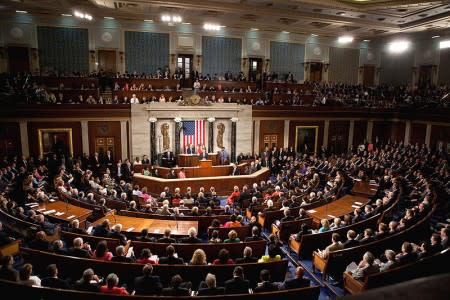Should Congress decide an indefinite military extension in Afghanistan?
Bruce Ackerman from Yale Law says Congress, and not President Obama, should debate and decide the matter of extending the American military presence in Afghanistan.
Before he signs off on a post-2014 security agreement with the United States, Afghan President Hamid Karzai has asked for the approval of a grand assembly, or loya jirga, of the country’s elders. But despite the importance of the deal — which will authorize offensive as well as defensive military operations well into the future — President Barack Obama is planning no similar consultation with the U.S. Congress. Simply put, he wants to commit American troops in Afghanistan without legislative approval.
As with other cases involving military force — bombing Libya and the on-going drone campaign, to cite two examples — the administration hasn’t published a timely legal opinion defending its unilateral executive action. But in fact, its constitutional case is very weak.
As commander-in-chief, the president has the right to make unilateral agreements with foreign governments concerning the treatment of military and supporting civilian personnel. Since World War II, presidents have negotiated about 100 such “status of forces” agreements throughout the world. But the standard agreement does not attempt to authorize U.S. troops to conduct offensive military operations on an ongoing basis. This additional step requires Congress or the Senate to make a formal commitment by passing a statute or ratifying a treaty.
The only potential source of authority for the prospective deal with Karzai is Congress’s initial authorization of an assault on Afghanistan seven days after the 9/11 attacks. But even in that moment of panic, lawmakers did not hand President George W. Bush a blank check. They rejected the White House’s demand for open-ended authority “to deter and preempt any future acts of terrorism or aggression against the United States.” As David Abramowitz, chief counsel to the House Committee on Foreign Relations, later explained, “Given the breadth of activities potentially encompassed by the term ‘aggression,’ the President might never have had to seek congressional authorization for the use of force to combat terrorism.”
Instead, Congress gave the president a more limited mandate that focused exclusively on the 9/11 tragedy, authorizing military force only against those who “planned, authorized, committed, or aided the terrorist attacks,” as well as against governments that harbored them.
Twelve years later, this mission has been accomplished. The Afghan government that “harbored” al Qaeda has long since been replaced by the Karzai regime. And as Obama emphasized in his path-breaking national security speech in May, the “[c]ore [of] al Qaeda is a shell of its former self … not every collection of thugs that labels themselves al Qaeda will pose a credible threat to the United States.” The CIA, meanwhile, reported that there are only 50 to 100 al Qaeda operatives left in all of Afghanistan.
Yet Obama’s proposed agreement continues to invoke the dangers posed by “al Qaeda and its affiliates” as grounds for further American military action — allowing administration lawyers to justify wide-ranging campaigns through expansive readings of the weasel-word “affiliates.” So long as the Afghan government gives its approval, the text makes clear that the United States can continue to “conduct combat operations” through 2024, or even longer if the Afghan government consents.
Reasonable people can disagree about whether the potential benefits of further combat are worth the costs. Perhaps it makes sense to make war simply to prop up the Karzai regime against the Taliban insurgency; perhaps it will prevent al Qaeda from regaining a significant capacity to attack the United States. Or maybe additional American strikes will only succeed in further alienating the Afghan public.
That is precisely why Congress should debate and decide the matter. This was, at least, the opinion of Sens. Barack Obama and Joseph Biden when Bush made a similar unilateral effort in 2008 to extend the use of American military power beyond the term originally authorized by Congress. That case involved Iraq, not Afghanistan, and proposed an extension of three years, rather than 10. But as in the present situation, Bush moved well beyond the traditional scope of the “status of forces” agreement to gain Iraq’s consent to a new round of military engagement — ignoring vigorous opposition by leading Democrats, who denounced this dangerous exercise of executive unilateralism. Five years later, the Obama administration is on the verge of reinforcing this sad precedent of the Bush era.
There is still time for Obama to reconsider the matter. In his opening speech to the loya jirga, Karzai announced that formal Afghan ratification of the new agreement should await the outcome of the country’s presidential election in April. Rather than pressing Karzai to change his mind, American negotiators should embrace this new timetable as an opening for the U.S. Congress to conduct serious debate about the merits of further engagement in Afghanistan. In his May national security speech, Obama recalled James Madison’s “warning that no nation could preserve its freedom in the midst of continual warfare.” It is time to take this warning seriously, and return the question of war and peace to Congress.
Bruce Ackerman is a professor at Yale Law School and the author of The Decline and Fall of the American Republic. This article first appeared in Foreign Policy.


